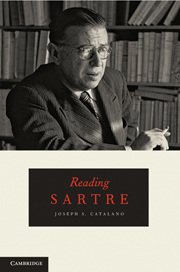4 - Being and Nothingness
Published online by Cambridge University Press: 05 June 2012
Summary
If I were a science-fiction novelist, I could not invent an extraterrestrial more strangely wondrous than an earthling child. Every child begins its adventure here on Earth with the capacity to question everything. Who can handle those endless “whys?” Who wishes to try? We feed children stories not merely to suit their tender minds, but because we adults are too often frightened by their questions.
True, a question appears harmless. Is it not merely an ordering of spoken or written words directed by one person to another? But these are its secondary manifestations. The nature of a question is revealed when we ask, “Who and what am I?,” or “What is this world in which I live?” These interrogations indicate that questioning touches the existence of all things, and it also reveals that we who question must be both united to and separate from what we question. We are united to the question, for it is our question about ourselves or about reality; yet, we are separate from this question insofar as we can take a new stance on it.
This bond between a questioner and what is questioned is described by Sartre as a “nothing,” or then again, as a “nihilation.” Whatever the term used in this context, it is clear that Sartre is not referring to an emptiness; perhaps it can be described as a certain “elsewhereness” that fractures the identity between questioner and what is being questioned so that new possible relations may arise between them.
- Type
- Chapter
- Information
- Reading Sartre , pp. 69 - 88Publisher: Cambridge University PressPrint publication year: 2010



